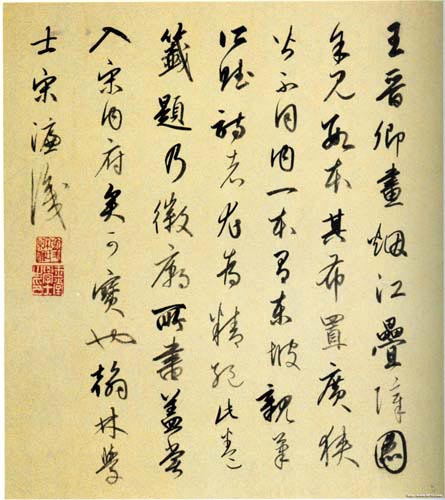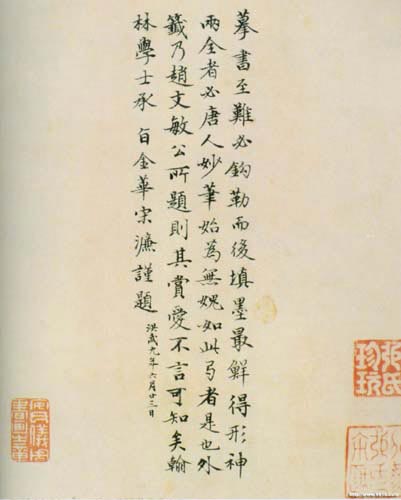Song Lian (1310-1381) was named Jing Lian. Born in Qianxi, Jinhua (now Fucun Township, Jinhua County), his family later moved to the foot of Qingluo Mountain in Pujiang River. When he was young, he studied in Jinhua, where he heard Meng Ji. Later, he went to Dongming Jingshe in Pujiang to learn from Wu Lai, and also traveled to Liu Guan and Huang Jinzhi. In the second year of the Yuan Dynasty (1336), at the invitation of the Zheng family of Yimen in Pujiang, he gave lectures at Dongming Jingshe under Qingluo Mountain in Pujiang and gave lectures for more than 20 years. He once served as the dean of Pujiang Yuequan Academy. In the ninth year of Zhizheng of the Yuan Dynasty (1349), he was recommended as editor of the Hanlin Academy. He resigned because of his relatives and lived in seclusion in Longmen Mountain to write books and give lectures.
In the 18th year of Zhengzheng Dynasty, Zhu Yuanzhang captured Wuzhou, opened a county school, and hired him as a teacher of the Five Classics. The next year, he was drafted to Yingtian (Nanjing), where he served as a Confucian scholar in Jiangnan, taught the Prince's Classics, and compiled commentary on daily life. He often served Zhu Yuanzhang as an advisor. In the second year of Hongwu in the Ming Dynasty (1369), he served as the chief executive of "History of the Yuan Dynasty", completed the book, and was promoted to a bachelor's degree in the Imperial Academy. In the fourth year, he was transferred to the position of Guozi Siye, and the next year he was promoted to the official of Zanshan. Taizu recruited Confucian scholars from all over the world and selected handsome young men to study in the Wenhua Hall in the palace, and ordered Lian to be his teacher. In the sixth year, he was promoted to a bachelor's degree, and he learned how to make imperial edicts and study national history. Ten years later, he became an official and returned home.
Song Lian was diligent and studious, and wrote prolifically. Zhu Yuanzhang called him "the first of the founding civil servants". He is the author of "New Theory of Filial Piety", "Collection of Zhou Rites", "Qianxi Collection", "Luoshan Collection", "Puyang Characters", etc. Later generations compiled his poems and articles into 75 volumes of "The Complete Works of Scholars of the Song Dynasty". The article was not only popular in China, but also widely circulated in Korea, Annan, Japan and other countries at that time.

Postscript to the picture of overlapping peaks on the Yanjiang River titled "Wang Xu"

Inscribed on the postscript of Yu Lanting








